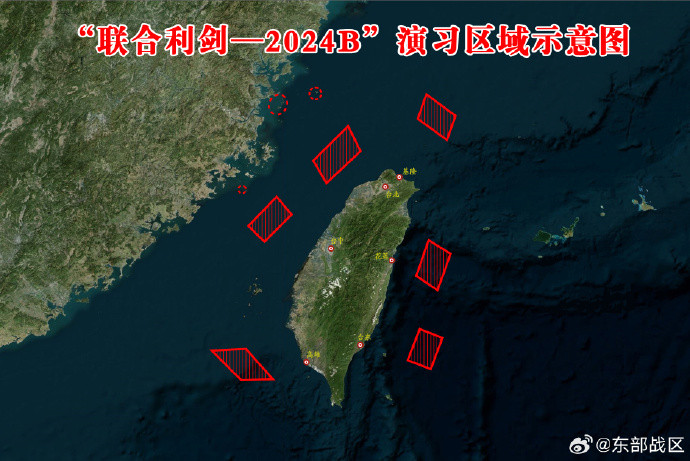China's military conducted a record number of aircraft operations around Taiwan during large-scale drills on Monday, marking a new level of tension between Beijing and Taipei. Taiwan's Defense Ministry reported that 153 Chinese warplanes, including fighter jets, drones, and other aircraft, were detected within a 25-hour period, with 111 of those crossing the sensitive Median Line in the Taiwan Strait.
While the line had historically acted as an informal buffer between the two regions, China has increasingly disregarded it in recent years. Taiwan condemned the drills as a "provocation," while Beijing described them as a necessary warning against separatist forces.
China's one-day "Joint Sword-2024B" military exercises also involved naval vessels and Coast Guard ships, simulating a blockade of Taiwan. Fourteen Chinese warships were spotted in the waters around the island, and the Chinese aircraft carrier Liaoning was positioned to the east of Taiwan. These drills are part of Beijing's broader strategy to apply military pressure on Taiwan, a self-governing democracy of 24 million people that China views as its territory. The drills are seen as a way for Beijing to normalize frequent military actions around the island while also testing Taiwan's defenses.
"Any drills without prior warning will cause great disturbance to peace and stability in the entire region," Taiwan's Premier Cho Jung-tai told reporters. "China's drills not only affect Taiwan's neighborhood but also seriously affect international navigation rights and air and sea space." Cho added that these actions have attracted attention from other countries, as global concerns about Beijing's military ambitions continue to grow.
The record-breaking maneuvers occurred just days after Taiwanese President Lai Ching-te delivered a defiant speech on Taiwan's National Day. Lai vowed to protect Taiwan's sovereignty, stating that the island "is not subordinate" to China, a remark that further angered Beijing. In response, China launched its military drills to signal its disapproval of what it perceives as Taiwan's push for independence. Beijing's ruling Communist Party has long asserted that Taiwan must eventually be "reunified" with mainland China, using force if necessary, although Taiwan's government strongly rejects this claim.
The U.S. Pentagon condemned China's actions as "irresponsible, disproportionate, and destabilizing." Washington has voiced consistent concern over the escalation of tensions in the Taiwan Strait, particularly as Beijing increases the frequency and scale of its military activities near the island. U.S. officials worry that Beijing's aggressive tactics could lead to miscalculations or accidental conflict.
While these drills appear to have backfired diplomatically for China, they have been successful in keeping pressure on Taiwan. "China's pressure attempts have only solidified support for Taipei," said Kuan Bi-ling, head of Taiwan's Ocean Affairs Council. "China's exercise, while intended to put military pressure on Taiwan and the international community, has backfired and led to greater international solidarity against China's expansionist behavior."
Despite the heightened tensions, the financial markets in Taiwan remained largely unfazed. The benchmark stock index in Taipei closed up 0.3% on Monday and rose an additional 1.4% on Tuesday, a sign that the markets are accustomed to China's frequent military actions around the island. Analysts are anticipating strong third-quarter earnings from Taiwan Semiconductor Manufacturing Company (TSMC), the region's largest and most valuable firm, which is expected to report a stellar performance later this week.
China's military drills were seen as part of a broader effort to normalize regular war games near Taiwan while simultaneously allowing China to practice military coordination across different branches of its armed forces. The People's Liberation Army (PLA) said the exercises were a joint operation of the army, navy, air force, and rocket force, and were conducted in nine areas surrounding Taiwan, including its outlying islands.
According to Leif-Eric Easley, a professor at Ewha Womans University in Seoul, China's increasing militarization near Taiwan serves both domestic and international purposes. "Kim Jong Un wants domestic and international audiences to believe he is acting out of military strength," Easley said. He noted that China's maneuvers are part of a strategy to shift blame for economic struggles and justify its growing military expenditures by exaggerating external threats.
Meanwhile, the Taiwanese government is investigating false reports online, including claims that Taiwan's military had failed to respond quickly to the drills. The investigation bureau of Taiwan's justice ministry suggested that these reports could be part of a broader disinformation campaign orchestrated by "overseas hacking armies," though no direct accusation was made against China.






